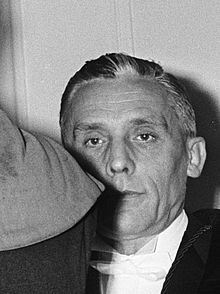Pieter De Somer
Pieter De Somer (born December 22, 1917 in Niel , † June 17, 1985 in Leuven ) was a Flemish physician and biologist . From 1968 until his death he was the first rector of the Katholieke Universiteit Leuven after the division.
Life
De Somer was born on December 22, 1917 in Niel, Belgium, where his father worked as a doctor . He attended school in Geraardsbergen in East Flanders , where his family had moved after his father's untimely death. While he was pursuing an engineering career himself, his mother wished that he would succeed his father and become a doctor. De Somer therefore studied medicine at the Catholic University of Leuven from 1935 to 1942 . In addition, he earned a degree in biology and a baccalaureate in philosophy , as well as a diploma in hygiene in 1943 . During his studies, De Somer was active in the Oost-Vlaamse Katholieke studentenactie and its chairman for the province of East Flanders from 1936 to 1938. In Leuven he was also a member of the Hoogstudentenverbond voor catholic actie . He was co-editor of the journal Universitas published by the association and acted as praeses of the association from 1938 to 1939 . He was also close to the Jong People's Front .
In 1942 De Somer began his research work with Richard Bruynoghe at the Institute for Bacteriology at the University of Leuven. The focus of his work shifted after hearing reports of the Allied use of penicillin . In 1945 he founded the Recherche et Industrie Thérapeutiques (RIT) laboratory in Genval , which is now part of GlaxoSmithKline , and worked there with his friend and later Nobel Prize winner Christian de Duve on the isolation of penicillin. From 1946 to 1947 he learned industrial extraction methods in Canada and in 1950 was able to replace the laboratory with a modern factory for the production of antibiotics .
In 1952 De Somer was a lecturer at the Catholic University of Leuven, in 1955 an associate professor and in 1961 a full professor at the medical faculty with a focus on microbiology and immunology . In this role he headed the Rega Institute for Medical Research, which was set up by RIT in 1954 and donated to the university, in which, among other things, a vaccine against polio was developed. This led Belgium to be one of the first countries in the world to eradicate polio. The Rega Institute has been cooperating with a wide variety of companies around the world since the 1970s and today includes various laboratories that do significant work, including in the field of AIDS research. De Somer also benefited economically from this success.
In 1962 the rector of the University of Leuven, Albert Descamps , appointed De Somer as his scientific advisor. Four years later, De Somer was appointed Vice-Rector of the Dutch-speaking department of the university and in 1968 the first non-spiritual Rector of the Katholieke Universiteit Leuven , a position he held until his death in 1985. He was elected to his post in 1971, 1976 and 1981.
Pieter De Somer left a lasting mark on KULeuven in many ways. During the great student revolts in 1968, De Somer won the trust of the students. At the same time he advocated absolute academic freedom of research and thus, to a certain extent, for emancipation from the dominant Catholicism . When Pope John Paul II visited Leuven in 1985, he took a clear position in favor of academic freedom and caused a sensation. De Somer also supported cooperation between university and industry at an early stage . In addition, from the split of the Catholic University of Leuven into a Flemish and a French part, he advocated an international and ambitious character for KULeuven. His remark that he would not let the university degenerate into a University of Hageland has become famous.
In 1980 the University of Ghent awarded him an honorary doctorate for his efforts to promote freedom of science .
De Somer died after a long illness on June 17, 1985 in Leuven University Hospital. The funeral ceremony took place on June 22, 1985 with great public participation in St. Peter's Church .
He had been married to Paula Legein since 1946, who came from a wealthy Bruges family, with whom he had six children.
In 1989 the Aula Pieter De Somer was opened in Leuven in his memory, the largest auditorium at the university. At the entrance there is a statue of the former rector, created by Vic Gentils .
Web links
literature
- Jo Tollebeek: Homo novus: A portrait of Pieter De Somer . In: Jo Tollebeek, Liesbet Nys: The City on the Hill: A History of Leuven University 1968-2005 . Leuven University Press, Löwen 2006, ISBN 978-90-5867-570-5 , p. 27 ff.
| personal data | |
|---|---|
| SURNAME | De Somer, Pieter |
| BRIEF DESCRIPTION | Flemish medic and biologist |
| DATE OF BIRTH | December 22, 1917 |
| PLACE OF BIRTH | Niel |
| DATE OF DEATH | June 17, 1985 |
| Place of death | Lions |
